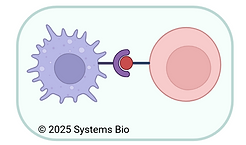Systems Bio
Systems Bio has a broad and in-depth analytics expertise in multiple fields of genomics. These include but not limited to the following:

NGS technologies enable unbiased profiling of molecular landscape of cells. Systems Bio supports analysis of NGS data including, but not limited to RNA-Seq, WGS, ATAC-Seq, ChIP-Seq, BS-Seq and Capture-C. In this way, Systems Bio helps you to profile transcriptional, mutational and epigenetic landscape of various biosamples to identify and validate drug targets.

Single-cell sequencing technologies revolutionized molecular research by profiling genomic landscape at the cellular level. Systems Bio supports analysis of NGS data including, but not limited to scRNA-Seq, scATAC-Seq, scChIP-Seq and scBS-Seq. In this way, Systems Bio helps you to profile the genetic and epigenetic landscape of biosamples at high resolution so that you can precisely discover and validate potential drug targets.

Genes do not perform their tasks themselves in isolation. Instead, they work together with other genes to maintain and preserve cell homeostasis. Pathway analysis helps to identify the changes of set of related genes that perform cellular functions together. Using this analysis, Systems Bio helps you to identify the biological pathways whose activities are changed in a disease, or as a response to a treatment or intervention.

Genes in the DNA are in constant interaction with many other genes, activating or repressing their activities. These interactions are issue- and cell type-specific changes and they can be associated with disease mechanisms. Furthermore, these interactions can be exploited for therapeutic vulnerabilities. Systems Bio helps you to construct gene regulatory networks to better disease- and therapy -related regulation mechanisms for drug target identification and validation.

Cells are continuously in communication with each other via various signaling molecules. Ligand and receptor proteins play a crucial role in this communication both for long and short distance interactions. Their dysregulation can be associated with various diseases and in-depth analyses of these interactions can pave the way for new therapeutic opportunities. Systems Bio helps you to profile this mechanism of communication using single-cell and spatial transcriptomics data.

Terminal cells form from progenitor cells by going through various steps of differentiation. Dysregulation of these processes can cause abnormal cell differentiation, leading to diseases. Comparing the cell differentiation trajectories in healthy and disease cell types can reveal new therapeutic opportunities. Systems Bio helps you to infer cell differentiation trajectories using genomic sequencing data.